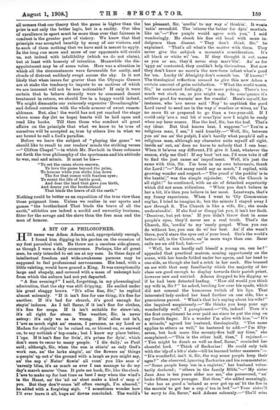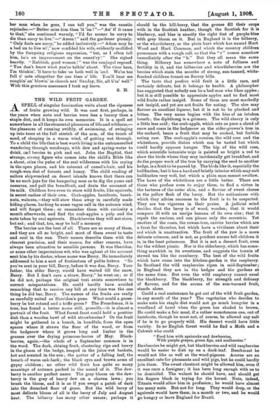A BIT OF A PHILOSOPHER.
HIS name was Adam Adams, and, appropriately enough, I found him digging in his garden on the occasion of my first parochial visit. He threw me a careless side-glance, as though I were a daily occurrence. Perhaps, like all great men, he only intended to set me at my ease. In these days of intellectual freedom and wide-awakeness parsons may be supposed to feel professional nervousness. His bead, with a little valeting, would have graced a King. It was exceptionally large and shapely, and covered with a mass of unkempt hair from which the auburn bad not yet departed.
"A fine evening?" I said, forgetting, in my phrenological admiration, that the sky was still dripping. He smiled under his great shaggy brows. "It's allus fine, Sir," he replied almost solemnly. 44 If it isn't fine for one thing, it's fine for another. If it's bad for church, it's good enough for atayin' indoors. As I tell Sarar, if it isn't fine for clothes, it's fine for crops. If it isn't suitable for straw-'ata, it's all right for straw. The weather, Sir, is never astray : it's only we as is wrong. B'in' allus out in't, I 'ave as much right an' reason, I persume, as my Lord or Madam for objectin' to be rained on, or blowed on, or snowed on, to say nothink o' top-coats ; but I know my place better, I 'ope. H it isn't fine for livin', it's prime for dyin', which don't seem to recur to many people. 'I die daily,' as Paul said; although, Sir, when the sun is shinin' as only God's work can, an' the larks singin', an' the flowers an' things a-peepin' up out o' the ground with a laugh as you might say, an' the sap o' Natur' flowin' all roan' you like seas o' 'eavenly bliss, it's as much as ever I can manage to do my day's march nearer 'Ome. It puts me back, Sir, like the clock. I 'ave to make up for lost time as best I may when the wind's in the Heast, an' the 'ail an' sleet make a kind o' mop o' you. But they don't• come 'alf often enough, I'm afeared," he added with a forgiving sigh. "I sometimes wonder how I'll ever leave it all, bups an' downs concluded. The world's
too pleasant, Sir, 'cordite to ray way o' thinkin. It wants 'eatiu' sevenfold, The 'otterer the better for dyin' martial%
like us."—"FeW people would agree with I said wonderingly. He shook his fine old head with more in- dulgence than dissent. " They don't think, Sir," he explained. "That's all what's the matter with them. They never give the aubjeck a moment's consideration. It's all black or white wi"em. If they thought it out, same as you or me, they'd never stop marv'llin'. An' as for 'appy an' contented, they couldn't help theirselves. But now they don't know no more'n the new-born infant what's good for 'em. Lucky th' Almighty don't consult 'em. 'E knows ! " The theological reflection seemed to give this new Adam a certain amount of grim satisfaction. " What the world wants, Sir," be continued feelingly, "is more poking. There's too much wet slack on, as you might say. In cons'quence it's neither good for warmin' nor for roastin. Here's myself, for instance, who 'ave never said Nay' to anythink the good Lord cared to send me in the way o' weather or wives, an' I'm no more fit or prepared to go than a two-year-old. If I could only 'ave a real bit o' cruc'fyin' now I might be ready when my hour comes. Has the leaf, Sir, has the leaf. That's my idear. But God knows best, I suppose."—" You're a religious man, I see," I said humbly.—" Well, Sir, between you an' me an' the pulpit, I ain't hardly what people'd call a religious man, although my character suits myself all right, inside an' out, an' does no harm to nobody that I can hear. When it beeves any different, I'll give it Lent, whatever the season, s'elp me God I If my boot 'urt me, I'd soon take it off to find the just cause an' imped'ment. Well, it's just the same with this, Sir. I'm boss in my own tabernacle, thank the Lord !"—" Not many could say as much," I replied, with growing wonder and respect.—" The proof o' the puddin' is in the heatin'," was the simple rejoinder. "Oh, the Church is all right!" he continued, with an air of detached superiority which did not seem ridiculous. " When you don't believe in her a bit, it's then you believe in her most. Leastways, that's my funny experience. When I went to 'Oly Communion reglar, I tried to imagine it; but the minute I stayed away I saw through it. The Church is like a wife, Sir ; she needs understandin'. If she fool or disapp'int you, it isn't her fault. 'Deceiver, but yet true.' If you didn't throw dust in some people's eyes, they'd never see a real truth. That's the Church, Sir, 'cordin' to my 'omely gospel. When you can do without her, you can do wi her best. An' if she wasn't there, you'd stare the eyes out o' your head. She's the world's better-'alf, is the Church, an' in more ways than one. Sarar calls me an old fool, but—" " Well, he can hardly call hisself a young un, can he ?" appealed that practical matron, coming opportunely on the scene, with her hands folded under her apron, and her head to one side, as though she had a crick in her neck. She beamed on me with that easy familiarity which the majority, of her class are good enough to display towards their parish priest, however new and untried. Adams dropped to his digging as if he had been detected loafing. "How old would you think my wife is, Sir ? " he asked, bending low over his spade, which did not conceal the humorous twitch of his lips. That interested lady cocked her head further on one side, like a precocious parrot. " What's that he's saying about his wife?" she inquired suspiciously.—" He thinks you keep your age wonderfully well," I paraphrased.—" Oh, indeed ! Then it's the first compliment he ever paid me since he put the ring on my fourth finger. It's a wonder I'm alive with him."—" It's a miracle," agreed her husband, theologically. " The same applies to others as well," he hastened to add.—"I'm fifty- seven, but look more like seventy-five half my time," she complained.—" This is the other half, then," I rejoined.- " You might be dumb as well as deaf, Sarar," reminded her cheerful lord. "Think of Sackarias! He could only talk with the 'elp of a bit o' slate—till he learned better manners."— " It's wonderful, isn't it, Sir, the way some people keep their ages P" she observed, ignoring Zacharias and his commentator. —"Some people keep 'em in a register," her husband volun- tarily declared ; " others in the family Bible."—" My sister Jane Ann is ten years older nor me," she persevered, " an' looks fifteen years younger. But then," she added meaningly, "she has as good a 'usband as ever got up an' lit the fire in the mornin' to get her a cup o' tea in bed."—" Your sister'll be sorry to die, Serer," said Adams solemnly.—" She'll miss
her man when he goes, I can tell you," was the caustic rejoinder.—" Better miss him than 'it 'im !"—" An' if it came to that," she continued warmly, " I'd far sooner be sorry to die than sorry to live."—" Amen !" said the gardener piously. " Only fools are sorry," he added inclusively.—" Adam may be a bad un to live wi'," now confided his wife, evidently mollified by the foregoing religious expression, " but, as I often tell him, he's an improvement on the cemet'ry!" She sighed heavily. " Rubbish, good woman !" was the conjugal reproof. "You don't know what you're talkin' about. The vicar here, I'm thinkin', '11 have to take us both well in 'and. We're too full o' oats altogether for our time o' life. You'll hear me coughin' an' blowin' in church nex' Sunday, Sir, all b'in' well." With this gracious assurance I took my leave.
S. H.



































 Previous page
Previous page